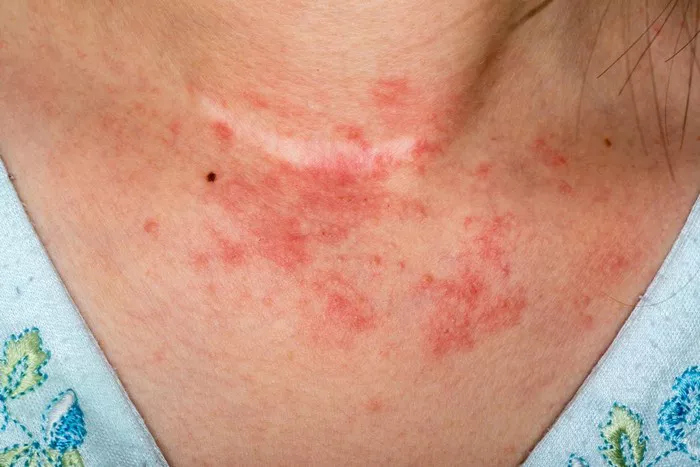Eczema, or atopic dermatitis, is a chronic skin condition characterized by inflammation, itching, and redness. One of the less discussed but equally distressing consequences of eczema is the darkening of the skin, a condition known as post-inflammatory hyperpigmentation (PIH). This article aims to provide a comprehensive overview of the causes, preventative measures, and treatment options for darkened skin resulting from eczema.
Understanding Post-Inflammatory Hyperpigmentation
Post-inflammatory hyperpigmentation (PIH) occurs when an injury or inflammation to the skin causes an overproduction of melanin, the pigment responsible for skin color. In the context of eczema, repeated scratching, inflammation, and irritation can lead to the formation of dark patches. These areas of hyperpigmentation can be particularly troubling for individuals with darker skin tones, where the contrast between affected and unaffected skin is more pronounced.
Causes of Skin Darkening in Eczema
1. Inflammation: Chronic inflammation leads to the release of cytokines and other inflammatory mediators, stimulating melanocytes (pigment-producing cells) to produce more melanin.
2. Scratching and Trauma: Persistent scratching damages the skin barrier and exacerbates inflammation, further promoting melanin production and deposition.
3. Infection: Secondary infections from scratching can cause additional skin trauma and inflammation, increasing the risk of hyperpigmentation.
4. Inappropriate Treatment: Using harsh or inappropriate skincare products can irritate the skin, causing further inflammation and darkening.
Preventative Measures
Preventing darkened skin from eczema requires a proactive approach to manage the condition effectively and minimize inflammation and trauma.
1. Moisturization: Keeping the skin well-hydrated is crucial. Use emollients and moisturizers regularly to maintain skin barrier function and prevent dryness and itching.
2. Avoid Triggers: Identify and avoid environmental and dietary triggers that can exacerbate eczema. Common triggers include certain fabrics, allergens, and stress.
3. Gentle Skincare: Use mild, fragrance-free cleansers and avoid products with harsh chemicals. Pat the skin dry after bathing rather than rubbing it.
4. Sun Protection: UV exposure can worsen hyperpigmentation. Use broad-spectrum sunscreen with at least SPF 30 daily, even on cloudy days.
5. Proper Treatment of Eczema: Early and effective treatment of eczema flare-ups can prevent the inflammation that leads to hyperpigmentation. This often involves the use of topical corticosteroids or other prescribed medications.
SEE ALSO: How to Treat Eczema Patches on Legs
Treatment Options
When hyperpigmentation occurs despite preventive efforts, several treatment options can help lighten the darkened skin.
1. Topical Treatments:
- Hydroquinone: A commonly used skin-lightening agent that inhibits melanin production. It is available in various concentrations, but it should be used under the guidance of a dermatologist to avoid potential side effects.
- Retinoids: Topical retinoids, such as tretinoin, can help increase cell turnover and fade hyperpigmentation over time. They also have anti-inflammatory properties that benefit eczema-prone skin.
- Corticosteroids: Low to medium-potency topical corticosteroids can reduce inflammation and, consequently, hyperpigmentation. However, prolonged use should be monitored to avoid skin thinning.
- Vitamin C: Known for its brightening properties, vitamin C can inhibit melanin production and promote collagen synthesis, helping to improve the appearance of dark spots.
2. Chemical Peels:
Chemical peels using alpha-hydroxy acids (AHAs) or beta-hydroxy acids (BHAs) can help exfoliate the skin and promote the shedding of hyperpigmented cells. These treatments should be performed by a professional to avoid exacerbating eczema.
3. Laser Therapy:
Laser treatments, such as fractional laser therapy, can target hyperpigmented areas without damaging surrounding tissue. This treatment is effective but should be performed by experienced practitioners to minimize the risk of complications.
4. Natural Remedies:
- Aloe Vera: Known for its soothing properties, aloe vera can help calm inflamed skin and may aid in lightening hyperpigmentation.
- Licorice Extract: Contains glabridin, which has skin-lightening properties and can help reduce the appearance of dark spots.
- Green Tea Extract: Rich in antioxidants, green tea extract can reduce inflammation and melanin production.
Integrating Treatments with Eczema Management
Successfully treating darkened skin from eczema involves a balanced approach that addresses both the hyperpigmentation and the underlying eczema. It is crucial to maintain consistent eczema management while introducing treatments for hyperpigmentation to avoid flare-ups that can worsen the condition.
1. Customized Skincare Routine: Develop a skincare routine tailored to both eczema and hyperpigmentation. This may include gentle cleansers, regular moisturization, and targeted treatments for dark spots.
2. Dermatological Supervision: Work with a dermatologist to create a treatment plan that considers the sensitivity of eczema-prone skin. Professional guidance ensures the safe and effective use of treatments like hydroquinone and retinoids.
3. Patient Education: Educate patients on the importance of sun protection, gentle skincare, and adherence to treatment plans to prevent and treat hyperpigmentation.
Psychological Impact and Support
The psychological impact of darkened skin from eczema can be significant, affecting self-esteem and quality of life. Supportive care, including counseling and support groups, can be beneficial for individuals struggling with the emotional aspects of their skin condition.
1. Counseling: Professional counseling can help individuals cope with the emotional burden of chronic skin conditions and improve their mental well-being.
2. Support Groups: Connecting with others who have similar experiences can provide a sense of community and reduce feelings of isolation.
Conclusion
Treating darkened skin from eczema requires a multifaceted approach that addresses both the immediate cosmetic concerns and the underlying condition. By combining effective eczema management with targeted treatments for hyperpigmentation, individuals can achieve significant improvements in their skin’s appearance and overall health. Consistent care, professional guidance, and psychological support are essential components of a comprehensive treatment strategy. With the right approach, it is possible to manage both eczema and its associated hyperpigmentation, leading to better skin health and quality of life.
Related Topics:

























